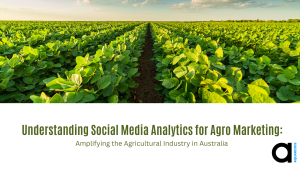Understanding Social Media Analytics for Agro Marketing: Amplifying the Agricultural Industry in Australia

The agricultural industry in Australia has long been the backbone of the nation’s economy, contributing significantly to its prosperity. As the industry evolves to meet the demands of a globalized world, marketing trends are rapidly changing. Among the transformative factors, 360° Digital Marketing Services Agency in Melbourne are leveraging social media analytics as a powerful tool to harness market insights, enhance agro-marketing strategies, and drive growth.
The Agricultural Industry in Australia: A Brief Overview
Australia’s agricultural sector plays a pivotal role in supplying high-quality produce, not only to its population but also to international markets. The country’s favourable climate, vast arable land, and efficient farming practices make it one of the world’s leading agricultural exporters. Key agricultural products include wheat, barley, wool, beef, dairy, and various fruits and vegetables.
Despite these strengths, the industry faces challenges, such as climate change impacts, water scarcity, market fluctuations, and changing consumer preferences. Therefore, understanding and adapting to market trends is critical to sustaining growth and remaining competitive.
Changing Marketing Trends in the Agricultural Industry
In recent years, the agricultural marketing landscape in Australia has undergone significant changes, driven by technological advancements and evolving consumer behaviours. Some key trends shaping the industry include:
- Digitalization: The agricultural sector has embraced digital platforms to connect with consumers and streamline operations. Farmers and agribusinesses are leveraging websites and e-commerce platforms to reach broader markets and improve accessibility to their products.
- Sustainability and Ethical Consumerism: Consumers are increasingly conscious of the environmental impact of their purchases. This trend has pushed the industry to focus on sustainable and ethical practices, leading to the rise of certifications like “organic” and “fair trade.”
- Personalization: Customers now seek personalized experiences and products. Agricultural businesses are using data-driven insights to tailor their offerings to meet individual preferences.
- Influencer Marketing: Collaborating with social media influencers who advocate for sustainable and locally-sourced products has become a popular marketing strategy to gain consumer trust and loyalty.
Tools for Social Media Analytics
To effectively measure and analyze social media data, agro-marketers can utilize various tools and platforms.
Google Analytics
Google Analytics is a robust tool that helps track website traffic, including traffic driven by social media platforms. It provides detailed insights into user behaviour and conversion rates.
Social Media Platforms Insights
Major social media platforms like Facebook, Twitter, and Instagram offer built-in analytics features that provide valuable data on post performance and audience engagement.
Third-Party Tools
Several third-party analytics tools offer advanced features, including competitor analysis, sentiment analysis, and automated reporting.
Social Media Analytics: Revolutionizing Agro Marketing
Social media analytics has emerged as a game-changer for the agricultural industry, providing valuable data-driven insights into consumer behaviour, market trends, and competitor analysis. Here’s how it is revolutionizing agro marketing:
- Understanding Consumer Behavior: Social media platforms offer an immense treasure trove of data on consumer preferences, opinions, and purchase patterns. Analyzing this data helps agribusinesses understand their target audience better and fine-tune their marketing strategies accordingly.
- Real-time Market Monitoring: Social media analytics tools allow agro marketers to monitor real-time market trends, enabling them to adapt quickly to changing demands and capitalize on emerging opportunities.
- Enhanced Customer Engagement: Social media platforms provide a direct channel for agribusinesses to engage with their customers, receive feedback, and address concerns promptly. This interaction fosters trust and loyalty among consumers.
- Competitor Analysis: Monitoring competitors’ social media activities and engagement levels provide valuable insights into their strategies. This enables agro-businesses to benchmark their performance and identify areas for improvement.
- Influencer Identification: Social media analytics helps agro marketers identify relevant influencers in the agricultural and environmental sectors, allowing them to collaborate with individuals who align with their brand values.
- Building Brand Reputation: Effective social media marketing builds a positive brand image. By analyzing sentiment and feedback, agro-marketers can address any negative perceptions and reinforce positive associations with their brand.
- Identifying Trends: By tracking popular hashtags and trending topics, agro marketers can capitalize on emerging trends and create timely and relevant content.o feedback more effectively.
Challenges in Social Media Analytics for Agro Marketing
While social media analytics offers tremendous opportunities, agro-marketers must be aware of the challenges associated with the process.
Data Privacy and Security
Handling user data requires strict adherence to privacy regulations to safeguard user information effectively.
Accuracy and Reliability
Inaccurate data can lead to misguided decisions. Agro marketers must ensure that the analytics tools and methodologies used provide reliable results.
Handling Negative Feedback
Social media analytics may highlight negative feedback or comments. Agro marketers should have strategies in place to manage such situations professionally.
Analyzing Competitor’s Social Media Strategies
Analyzing competitors’ social media strategies is a crucial step for agro companies looking to gain a competitive edge in the digital landscape. By closely examining what tactics and content resonate with the competitor’s audience, agro-businesses can uncover valuable insights and adapt their marketing approach accordingly. It helps identify gaps and opportunities, refine messaging, and stay abreast of industry trends. Through this analysis, agro companies can not only benchmark their performance but also innovate and differentiate their brand. Understanding the strengths and weaknesses of competitors allows for strategic advantage, enabling agro-businesses to enhance their social media presence.
Conclusion
The agricultural industry in Australia is experiencing a transformation, driven by changing marketing trends and technological advancements. Social media analytics has emerged as an indispensable tool, empowering agribusinesses with valuable market insights and data-driven strategies. By leveraging social media analytics, agro marketers can better understand consumer behaviour, monitor real-time market trends, and engage with customers. As the industry continues to evolve, embracing social media analytics will be crucial for overall success in the agricultural sector.
In the realm of understanding social media analytics for agro-marketing, Aquarious Technology emerges as a leading 360° Digital Marketing Services Agency in Melbourne. The company is poised to provide invaluable assistance to agro-businesses with a team of proficient SEO writers and content creators, offering tailor-made solutions to harness the power of social media analytics effectively. They specialize in analyzing key metrics, identifying trends, and formulating data-driven strategies that resonate with the target audience. With their expertise and cutting-edge tools, Aquarious Technology empowers agro marketers to optimize social media campaigns, drive engagement, and achieve remarkable growth in the competitive agricultural landscape.
-
14
+Category
-
98
+Post
Top Categories
Popular Posts
- The Power of Prototyping in Software Development
- Version Control Best Practices for App Development
- Understanding Visual Hierarchy: A Guide to Effective Design
- Crafting Intuitive Navigation: A Guide to Seamless User Experience
- Choose Your Best Cloud Provider
- Making the Leap: Transitioning from Manual to Automated Software Testing
- Using GitHub- Advantages and Disadvantages
- E-commerce Product Photography on a Budget
- Tech Innovation in Developing Countries
- Smart Cities: How Technology is Shaping the Urban Landscape
- Principles of Composition: Creating Visual Harmony with Composition
- Exploring Cross-Platform App Development
- Why Regular Website Updates Matter
- Navigating Effective Facebook Audience Targeting
- Implementing Ads for Game Monetization
- Designing User-Centric Mental Health Apps: Enhancing Well-being in the Digital Age
- NFTs and Collectibles: Creating NFT App Solutions for Collectors and Enthusiasts
- Successful Implementation of Enterprise Apps
- Maximizing Business Impact with EQ
- Proven SMO Ads Optimization Tips (2023)






